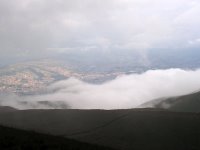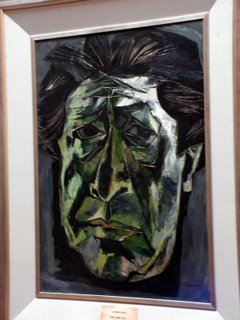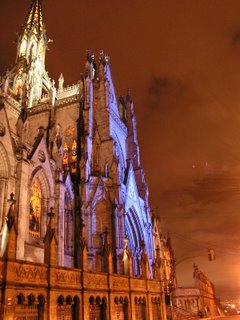----------
Quito is is a little like the answer to "Why Colombia?": it's complicated. My best friend's younger brother, who has lived there for several years now and is marrying an Ecuadorian woman he met at the university, says it's a nice place to visit but a terrible place to live. The inverse of what most people say about Atlanta. I felt unsafe the entire time we were in Quito, and relieved when we left the city for a smaller town in the countryside. The historic center of Quito is absolutely breathtaking in many ways, but small children, 5 and 6 years old, still pull your heart in 100 directions with their sales pitches that rapidly become pleas to buy gum, buy chocolate, please lady, buy something. Middle class Quitenos insist that giving one of these children even a coin is tantamount to buying them drugs. I don't buy it, but have to admit it's a choice among non-choices. Our tour guide said doing so would just encourage their parents to continue exploiting them, as if the parents were doing anything other than picking between non-choices as well. Few things throw me more than this. The next stop on the night tour of old town Quito was the Panecillo, the Virgin of Quito. I wonder how many prayers she hears, and how many have stopped seeking her protective gaze?

 Something Quito does have going for it is Oswaldo Guayasamin. I had seen one or two prints in friends' homes, but was not familiar with his work. The Capilla del Hombre was stunning and rather spiritually taxing. This man had a serious social conscience.
Something Quito does have going for it is Oswaldo Guayasamin. I had seen one or two prints in friends' homes, but was not familiar with his work. The Capilla del Hombre was stunning and rather spiritually taxing. This man had a serious social conscience. Conference
The conference was incredibly dense and most of us shut down at one point or another, but it was also incredibly inspirational, which sounds silly but is true. People were interesting and had compelling ideas, not just about their particular projects or areas of study, but about the countries in which they are living in general.
Just from talking with other Fulbrighters I learned about Bolivian indigenous movements, Venezuelan community television, 50 cent scandal newspapers and presidential elections in Peru, Ecuadorian elite attitudes, some Waorani's experience with Belgian reality tv, and potato weevils. I'm a little overwhelmed, but excited to get back to work with a clearer idea of my own project after a week of explaining to people.

 Monday, sessions all day, welcome dinner at the historic San Diego convent at night. Tuesday, sessions then a night tour of the historic center of Quito.
Monday, sessions all day, welcome dinner at the historic San Diego convent at night. Tuesday, sessions then a night tour of the historic center of Quito.
 Wednesday evening the sessions ended, and Thursday morning we left for Banos, town of hot springs and cascadas. Several ice cream stops later, we hiked to a waterfall full of power and grace, then set up at our (waterless) hostel, set high in the hills over Banos.
Wednesday evening the sessions ended, and Thursday morning we left for Banos, town of hot springs and cascadas. Several ice cream stops later, we hiked to a waterfall full of power and grace, then set up at our (waterless) hostel, set high in the hills over Banos.

 Friday was back to Quito, where we stayed in a hostel in gringolandia; Saturday and Sunday spent exploring the city with friends.
Friday was back to Quito, where we stayed in a hostel in gringolandia; Saturday and Sunday spent exploring the city with friends.
 We took a cable car up a mountain called Pichincha overlooking the city, climbed to the top of the Basilica, went to a museum, and watched a little Equavolley (a hybrid version of volleyball in which people have been known to lose houses, cars, boats...), then caught the evening flight back to Bogota.
We took a cable car up a mountain called Pichincha overlooking the city, climbed to the top of the Basilica, went to a museum, and watched a little Equavolley (a hybrid version of volleyball in which people have been known to lose houses, cars, boats...), then caught the evening flight back to Bogota.
 It sounds funny to my ears, but it's good to be home. Who knew?
It sounds funny to my ears, but it's good to be home. Who knew?
Just from talking with other Fulbrighters I learned about Bolivian indigenous movements, Venezuelan community television, 50 cent scandal newspapers and presidential elections in Peru, Ecuadorian elite attitudes, some Waorani's experience with Belgian reality tv, and potato weevils. I'm a little overwhelmed, but excited to get back to work with a clearer idea of my own project after a week of explaining to people.

 Monday, sessions all day, welcome dinner at the historic San Diego convent at night. Tuesday, sessions then a night tour of the historic center of Quito.
Monday, sessions all day, welcome dinner at the historic San Diego convent at night. Tuesday, sessions then a night tour of the historic center of Quito. Wednesday evening the sessions ended, and Thursday morning we left for Banos, town of hot springs and cascadas. Several ice cream stops later, we hiked to a waterfall full of power and grace, then set up at our (waterless) hostel, set high in the hills over Banos.
Wednesday evening the sessions ended, and Thursday morning we left for Banos, town of hot springs and cascadas. Several ice cream stops later, we hiked to a waterfall full of power and grace, then set up at our (waterless) hostel, set high in the hills over Banos.
 Friday was back to Quito, where we stayed in a hostel in gringolandia; Saturday and Sunday spent exploring the city with friends.
Friday was back to Quito, where we stayed in a hostel in gringolandia; Saturday and Sunday spent exploring the city with friends. We took a cable car up a mountain called Pichincha overlooking the city, climbed to the top of the Basilica, went to a museum, and watched a little Equavolley (a hybrid version of volleyball in which people have been known to lose houses, cars, boats...), then caught the evening flight back to Bogota.
We took a cable car up a mountain called Pichincha overlooking the city, climbed to the top of the Basilica, went to a museum, and watched a little Equavolley (a hybrid version of volleyball in which people have been known to lose houses, cars, boats...), then caught the evening flight back to Bogota. It sounds funny to my ears, but it's good to be home. Who knew?
It sounds funny to my ears, but it's good to be home. Who knew?






1 comment:
Ah, Equavolley. I watched that being played in the large park near QuiCentro, wishing I could discern the different rules or simply play along. Didn't know I'd lose my boat, though.
Post a Comment